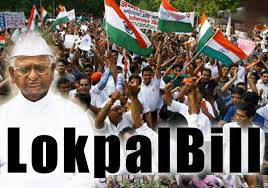New Delhi, Dec 18: The historic Lokpal Bill today took a giant step towards enactment after a 40-year wait, with the Lok Sabha passing it a day after the anti-corruption measure sailed through the Rajya Sabha with the support of opposition parties.
"It is our responsibility to complete our unfinished fight against corruption," said Congress leader Rahul Gandhi, who is being pitched by his party as its leading champion for the Lokpal initiative.
Shortly afterwards, the government's key ally Mulayam Singh Yadav and his Samajwadi Party staged a strategic walkout after slamming the Bill. The party was yesterday talked into backing down on its threat to block the Bill at any cost.
"In a democracy the people's representatives are supreme. This Bill will allow a policeman to come and harass us. Have MPs and MLAs not been convicted under existing laws?" Mr Yadav said, urging Prime Minister Manmohan Singh and Congress president Sonia Gandhi to speak up on the proposed law.
Senior BJP leader Sushma Swaraj, the Leader of Opposition in the Lok Sabha, appeared to target the ruling Congress as she criticized attempts to take credit for pushing the Lokpal Bill. She said Anna Hazare deserved credit for it.
"People are lining up to take credit, but there is an old man who keeps fasting for the bill and appeals to our collective conscience. And then the people of this country deserve credit," she said.
Anti-corruption crusader Anna Hazare has said he will call off his indefinite hungerstrike - now in its ninth day - once the lower house passes the bill.
Anna is fasting to demand that Parliament give life to the legislation, first proposed 46 years ago, in the current Winter Session which ends on Friday. But the ruling Congress' extreme zeal to ensure that happens is being seen more as a result of the massive losses it suffered in the recently held Assembly elections.
In Delhi, which it had ruled for 15 years, the Congress was felled by Arvind Kejriwal's one-year-old Aam Aadmi Party, which made a stunning debut based on its promise to fight corruption.
In general elections due by May, corruption and clean governance are expected to be top campaign issues.
The Lokpal Bill provides for the appointment of a powerful anti-graft ombudsman to investigate wrongdoing in government.





Comments
Add new comment